Dads and partners
As the main supporter for a pregnant woman and an expectant parent yourself, your feelings and needs can sometimes be overlooked. Your role is really important. We know that the early involvement of a dad or partner has many benefits for children and your support will be invaluable to your partner too.
If you live in Torfaen you may be intereseted in, For Dads, By Dads which is is a ten-week support programme aimed at helping new and expectant dads with children up to the age of 18 months in a safe environment. The programme will feature weekly workshops and talks, covering a wide range of subjects to support dads on their parenting journey. For more info visit: For Dads, By Dads | Torfaen County Borough Council
Finding out your partner is pregnant can be an emotional rollercoaster. You are probably finding that your partner is very emotional too – the hormones of pregnancy can make women very tearful and dealing with all this is not easy. Confide in friends who are already fathers/parents and who know what you are going through. Give your partner a little time – talk to one another about all the changes in your lives and give your friends and family chance to spoil you and look after you – they’ll want to – make the most of it.

Finding out your partner is pregnant can be an emotional rollercoaster. You are probably finding that your partner is very emotional too – the hormones of pregnancy can make women very tearful and dealing with all this is not easy. Confide in friends who are already fathers/parents and who know what you are going through. Give your partner a little time – talk to one another about all the changes in your lives and give your friends and family chance to spoil you and look after you – they’ll want to – make the most of it.

You will want to support your partner, but knowing how, can be difficult, especially if she is feeling very tired and sick in early pregnancy. She may be grumpy and it can be difficult to know what to do for the best. Knowing more about what’s going on and what to expect can help you feel more confident. You will be very welcome to attend antenatal appointments and ask questions and lots of areas run sessions to help you prepare for parenting, or parents groups. Ask your midwife what’s going on in your area.
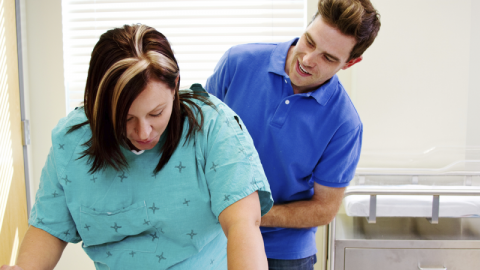
You will want to support your partner, but knowing how, can be difficult, especially if she is feeling very tired and sick in early pregnancy. She may be grumpy and it can be difficult to know what to do for the best. Knowing more about what’s going on and what to expect can help you feel more confident. You will be very welcome to attend antenatal appointments and ask questions and lots of areas run sessions to help you prepare for parenting, or parents groups. Ask your midwife what’s going on in your area.

It seems obvious that a pregnant mum needs to look after herself to help her baby be healthy, but so do partners. Looking after your health now has lots of benefits:
- If you smoke you will damage your growing baby’s health. Stopping will help your baby and will be supportive to your partner if she is trying to give up too. Please click here for help with quitting smoking.
- Eat well and take exercise. Mum is being encouraged to eat healthily and keep active and if you join in too it will help her. You will both begin life with your new baby feeling better and more able to cope with the stresses and strains of being new parents. Please click here for advice on eating well during pregnancy
- Setting good habits now makes it easier to have a happy and healthy family life as your baby grows
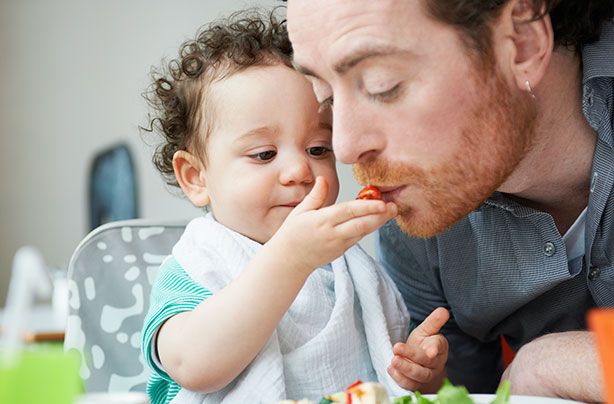
It seems obvious that a pregnant mum needs to look after herself to help her baby be healthy, but so do partners. Looking after your health now has lots of benefits:
- If you smoke you will damage your growing baby’s health. Stopping will help your baby and will be supportive to your partner if she is trying to give up too. Please click here for help with quitting smoking.
- Eat well and take exercise. Mum is being encouraged to eat healthily and keep active and if you join in too it will help her. You will both begin life with your new baby feeling better and more able to cope with the stresses and strains of being new parents. Please click here for advice on eating well during pregnancy
- Setting good habits now makes it easier to have a happy and healthy family life as your baby grows

Dads and partners are important, whatever shape or size your family. Sometimes, especially in the early days after birth, some partners feel a bit lost or not sure what to do. Partners sometimes feel left out and envious of the baby.
Your new baby is the ‘star of the show’, quickly followed by mum because she did all the hard work of giving birth. Mum will be getting lots of attention because she needs to recover from the birth. Where does that leave you as a partner?
Partner’s role
Your job for now is to look after mum and baby together. Keep them safe and support mum by doing all the practical things so she can focus on your baby. Do the shopping, the cooking and washing. In a few days or weeks, your baby will become more interested in the world around her and they’ll need feeding slightly less often. They will want to play with you when they is awake and you will learn to comfort and soothe them. The support and understanding a mum receives from those around her – her partner, parents and friends – can make a huge difference at this time. If people around her think about how she’s feeling, then she is more likely to be able to concentrate on providing the physical and emotional care for your baby.
Dads and partners are important, whatever shape or size your family. Sometimes, especially in the early days after birth, some partners feel a bit lost or not sure what to do. Partners sometimes feel left out and envious of the baby.
Your new baby is the ‘star of the show’, quickly followed by mum because she did all the hard work of giving birth. Mum will be getting lots of attention because she needs to recover from the birth. Where does that leave you as a partner?
Partner’s role
Your job for now is to look after mum and baby together. Keep them safe and support mum by doing all the practical things so she can focus on your baby. Do the shopping, the cooking and washing. In a few days or weeks, your baby will become more interested in the world around her and they’ll need feeding slightly less often. They will want to play with you when they is awake and you will learn to comfort and soothe them. The support and understanding a mum receives from those around her – her partner, parents and friends – can make a huge difference at this time. If people around her think about how she’s feeling, then she is more likely to be able to concentrate on providing the physical and emotional care for your baby.
Skin to skin is not just reserved for mum. It is vitally important that dad and partners also partakes in this ancient art of snuggling with their new-born. In fact, this close contact with dad and partners brings about many of the same remarkable benefits as it does with mum. Being warm and snug in your arms, is your new-born’s favourite place to be. They often cry less, sleep better and are more content when warm against your skin. Be that mum or dads.
Research has shown that skin to skin at birth with both parents is important. This is your opportunity to begin a bond with your child. Research studies have shown that even 30 minutes of skin-to-skin increases dopamine and oxytocin and lowers testosterone, doing exactly what it needs to – creating the natural bond between parent and child. Once your baby has had a good hour or two with his mum and finished the first feed hold your baby close in skin to skin contact.
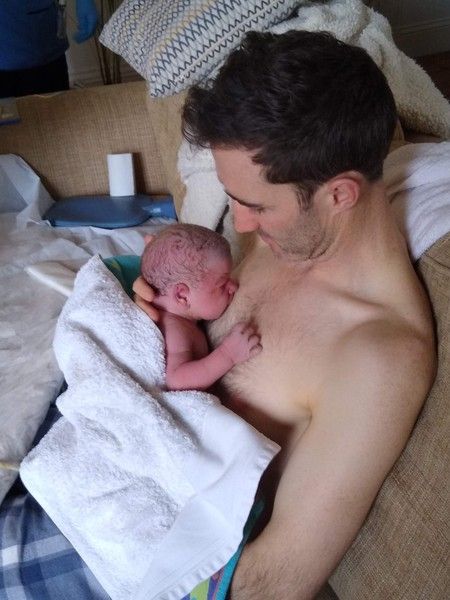
Skin to skin is not just reserved for mum. It is vitally important that dad and partners also partakes in this ancient art of snuggling with their new-born. In fact, this close contact with dad and partners brings about many of the same remarkable benefits as it does with mum. Being warm and snug in your arms, is your new-born’s favourite place to be. They often cry less, sleep better and are more content when warm against your skin. Be that mum or dads.
Research has shown that skin to skin at birth with both parents is important. This is your opportunity to begin a bond with your child. Research studies have shown that even 30 minutes of skin-to-skin increases dopamine and oxytocin and lowers testosterone, doing exactly what it needs to – creating the natural bond between parent and child. Once your baby has had a good hour or two with his mum and finished the first feed hold your baby close in skin to skin contact.

Most brain development occurs between birth and age two, so babies and toddlers need stimulation as much as they need nourishing food. The best way to stimulate babies’ brains is to connect with them through ‘mutual gaze’ and talk to them from the moment they are born. Gaze directly into your baby’s eyes, talk to her and wait for her response. This stimulation will strengthen the connections that make learning possible. It will also help her learn to talk, because it is from listening to your voice that she will learn to use language. Good speaking and listening skills will help them to become a good reader and writer later on.
Communicating, talking and interacting with your baby will help them to develop social skills and good relationships. It is also a way for you to show that you love and respect them and help their self–esteem to grow. Spending time talking with them will help the two of you form a close bond. Communication is the basis of your relationship with each
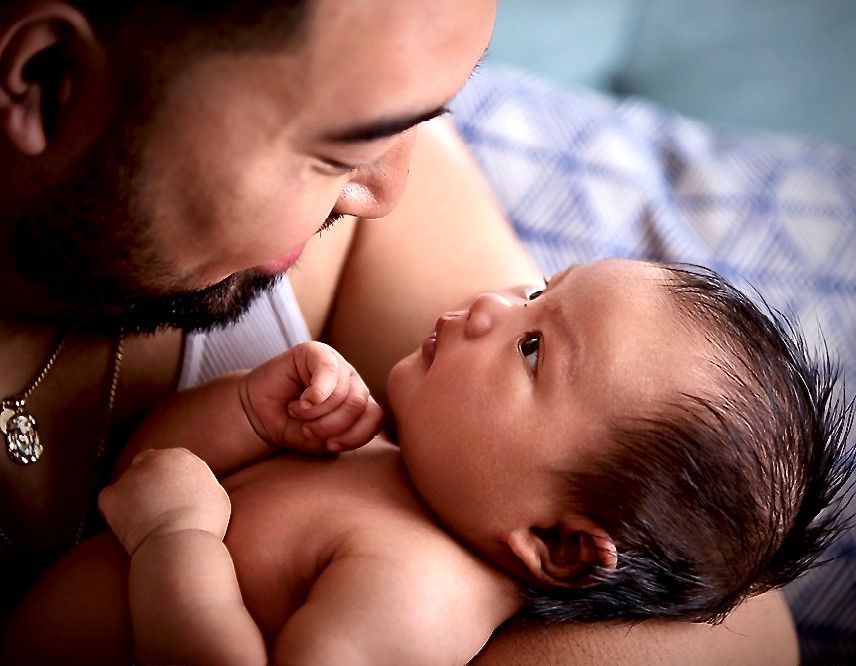
Most brain development occurs between birth and age two, so babies and toddlers need stimulation as much as they need nourishing food. The best way to stimulate babies’ brains is to connect with them through ‘mutual gaze’ and talk to them from the moment they are born. Gaze directly into your baby’s eyes, talk to her and wait for her response. This stimulation will strengthen the connections that make learning possible. It will also help her learn to talk, because it is from listening to your voice that she will learn to use language. Good speaking and listening skills will help them to become a good reader and writer later on.
Communicating, talking and interacting with your baby will help them to develop social skills and good relationships. It is also a way for you to show that you love and respect them and help their self–esteem to grow. Spending time talking with them will help the two of you form a close bond. Communication is the basis of your relationship with each

As well as needing practical help, new mums need support, reassurance and someone to listen to them. There’s so much you can do to help:
- Be ready to listen and pass the tissues when mum is emotional
- Remind her that the baby blues are common and will pass
- Make sure she isn’t overwhelmed by visitors
- Help with the baby
- Offer to do the cleaning, cooking and ironing
- Make sure she gets as much rest as possible
Dad’s view: “The important thing to remember is that it’s not the big things that make the difference but as many little things as possible. A cup of tea, a cuddle or telling great auntie Zelda that no, she can’t come and visit. Again. It’s being the arm around the shoulder without being dramatic about it.” Craig from Cardiff Bump, Baby & Beyond (Public Health Wales)
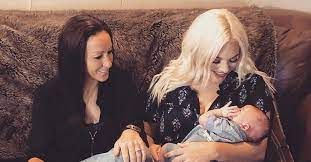
As well as needing practical help, new mums need support, reassurance and someone to listen to them. There’s so much you can do to help:
- Be ready to listen and pass the tissues when mum is emotional
- Remind her that the baby blues are common and will pass
- Make sure she isn’t overwhelmed by visitors
- Help with the baby
- Offer to do the cleaning, cooking and ironing
- Make sure she gets as much rest as possible
Dad’s view: “The important thing to remember is that it’s not the big things that make the difference but as many little things as possible. A cup of tea, a cuddle or telling great auntie Zelda that no, she can’t come and visit. Again. It’s being the arm around the shoulder without being dramatic about it.” Craig from Cardiff Bump, Baby & Beyond (Public Health Wales)

Your support will help your partner and baby get off to a good start with breastfeeding. Breastfeeding can be a bit tricky for the first few days and they will need you to be encouraging and supportive. You can provide practical support so mum can concentrate on feeding the baby, or so that she can rest. Make sure that mum has plenty to eat and drink and that she doesn’t have to worry about keeping the house tidy or doing the washing. Keep the number of visitors limited. Above all, make sure you tell her often that she’s doing a brilliant job.
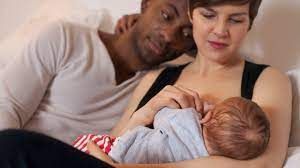
Your support will help your partner and baby get off to a good start with breastfeeding. Breastfeeding can be a bit tricky for the first few days and they will need you to be encouraging and supportive. You can provide practical support so mum can concentrate on feeding the baby, or so that she can rest. Make sure that mum has plenty to eat and drink and that she doesn’t have to worry about keeping the house tidy or doing the washing. Keep the number of visitors limited. Above all, make sure you tell her often that she’s doing a brilliant job.

In theory having a baby should be a joyous time which brings you and your partner closer. In reality it can sometimes put a real strain on even the best relationships. You can both be tired and can feel your world has been turned upside down. Partners can feel ‘shut out’ by the new arrival. Your sex life may well suffer and that can put pressure on you both.
Support can be found at:
Website: Parent Talk Cymru
Website: Relate Cymru
Website: Parenting - give it time
Website: Dads Can Cymru
Website: Dads Matter
Website: #Dadchats
Website: Same sex parenting relationships - Family Lives
Website: Stonewell - A Guide for Gay Dads
Website: Pregnant pause - A guide for lesbians on how to get pregnant
Website: NCT - Two-mum families: sharing experiences and support
Website: NHS 111 - LGBTQ+ Having Children
Website: For Dads, By Dads | Torfaen CBC
In theory having a baby should be a joyous time which brings you and your partner closer. In reality it can sometimes put a real strain on even the best relationships. You can both be tired and can feel your world has been turned upside down. Partners can feel ‘shut out’ by the new arrival. Your sex life may well suffer and that can put pressure on you both.
Support can be found at:
Website: Parent Talk Cymru
Website: Relate Cymru
Website: Parenting - give it time
Website: Dads Can Cymru
Website: Dads Matter
Website: #Dadchats
Website: Same sex parenting relationships - Family Lives
Website: Stonewell - A Guide for Gay Dads
Website: Pregnant pause - A guide for lesbians on how to get pregnant
Website: NCT - Two-mum families: sharing experiences and support
Website: NHS 111 - LGBTQ+ Having Children
Website: For Dads, By Dads | Torfaen CBC




